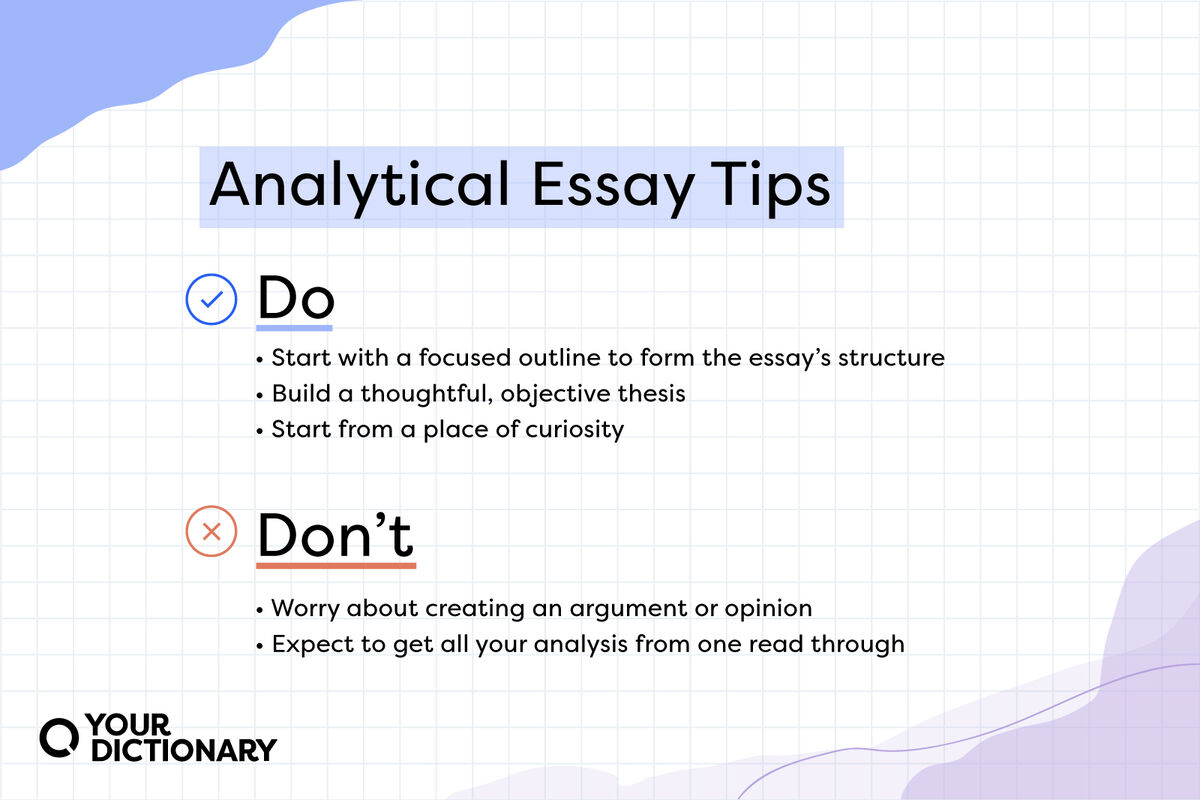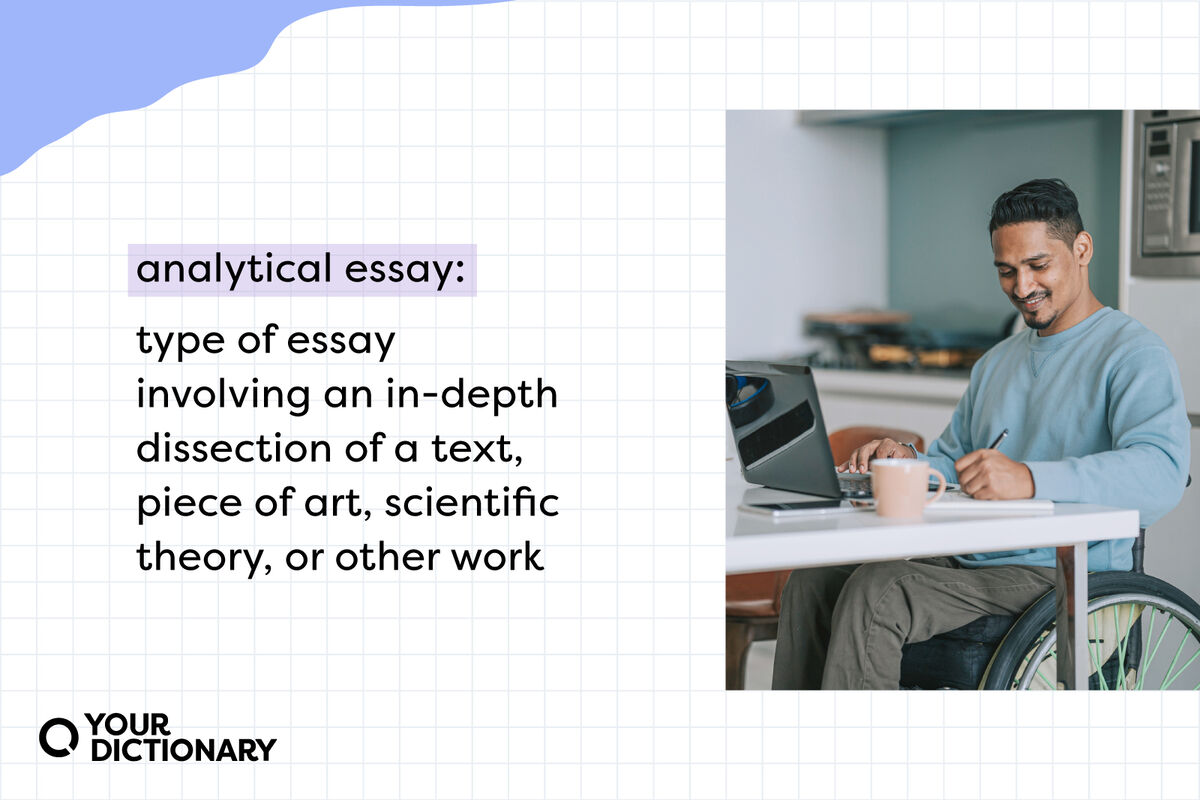
Analysis is something you’re doing constantly to some extent, even if you don’t realize it. You’re looking at the world around you and interpreting it in some way, big or small. What are the themes in that movie? What is the actual message that your friend is trying to convey? What is a hot dog? That all means that you already have the basics to write an analytical essay, but how do you take that analysis to the next level?
Make Sure You Understand What “Analysis” Means
Analysis can come in various forms and at various levels, but what does it mean to analyze something? Analysis generally includes breaking something down into its parts, finding meaning in those parts, and seeing how they react to each other separately and together.
Think of, say, a poem. That poem includes words, metaphors, rhymes, and all kinds of other literary devices. Think of each of those things as a building block. With analysis, you are:
- Pulling away each building block one by one
- Looking at each block under a microscope
- Investigating what that singular element is doing on its own and what it’s doing when you put those building blocks back together
What happens if you remove a building block entirely? Or what if you replace one block with another block that’s roughly the same shape and size? That’s what you’re trying to express through an analytical essay.

Organize Your Analysis With a Focused Outline
No matter how many essays you’ve written, you should always start with an outline. It’ll keep your thoughts organized, give you a basic framework for your essay, and instill a sense of achievement from just putting some words on paper.
Analytical essays are a little more straightforward and rigid in structure than other essay forms. A basic analytical essay will look like:
- Introduction
- A hook sentence to draw the reader in
- General context about the topic that you are analyzing
- A “thesis” that states the high-level idea of your analysis (as opposed to an opinion or argument)
- Body paragraphs
- A topic sentence to lead into the point of analysis
- Focus on one idea or element at a time (for example, a paragraph all about one line of a poem)
- A (hopefully) smooth transition to your next point of analysis
- Conclusion
- Sum up your high-level analysis again
- Consider questions or other points of analyses that may be worth covering in a future essay
- A potential call to action
Keep Your Opinions Out of It (Mostly)
This might seem counterintuitive to essays in general, but don’t put too much pressure on yourself to build an argument or present an opinion. Obviously, you should feel free to express your thoughts and ideas in your analytical essay, but you don’t need to take a side. This is much closer to an expository essay than an argumentative essay.
The most important part of an analytical essay (more so than any other essay) is the analysis. Understanding that can be really freeing. Don’t worry about evidence or supportive texts. Instead, use the space to really get into the guts of what you’re analyzing. Use quotes and context from the work to build up your interpretation and evaluation.
Build an Insightful, Objective Thesis
Most students learn that the thesis of an essay is supposed to act as the main argument, but if you’re not arguing anything in an analytical essay, what does the thesis even do?
A thesis for an analytical essay should still dig deep and consider the larger context and effects of the thing that you’re analyzing. Remember, it’s an essay, not a book report.
Take this (not great) thesis:
The Super Plumber Man series is about love.
Not really interesting or insightful, right? Worse yet, it doesn’t really give you a great jumping-off point for the analysis in the rest of your essay. Something like love is already such a broad concept that whole albums, books, movies, and literary canons have addressed.
- What elements in the text suggest it’s about love?
- What is it actually saying about love, and how?
- What is this one piece specifically saying about it?
- Why does any of that matter?
Give some extra thought to those (and other) questions, and you might get a more in-depth thesis like:
Through conversations revolving around plumbing as an act of labor, the Super Plumber Man series considers the concept of love through a lens of community-based care.
That thesis is more in-depth and gives you a more focused starting point, and it does so without stating an argument or opinion or making a judgment on the piece as a whole.
Start From a Place of Curiosity: Use Questions To Build Your Analysis
Analysis of any kind is hard, so building an entire essay around analysis is even harder. If you’re having trouble analyzing a work, start from a place of curiosity. Don’t even think about the essay. What questions arise as you read, look at, listen to, or otherwise experience the work?
- What is the main idea that the work is trying to convey?
- Why did the author use that word over a different word?
- What effect does word choice have on the piece as a whole?
- How do the characters (if any) interact with one another?
- Does the piece work with any metaphors, symbols, or other literary devices?
Reread and Re-Experience the Work for a Better Analysis
Don’t expect to get every little detail, metaphor, or idea from reading (or experiencing) the work once. Give yourself extra time to read, listen to, or look at the work more than once to really get into the analysis.
This isn’t about memorization. It’s about finding new avenues and points of analysis with each reread. Read first for your own sake, building that curiosity that we mentioned earlier and just finding what you’re interested in outside the confines of the essay.
Practice Active Reading (or Experiencing)
As you go through multiple readings, start finding answers to your questions. Practice active reading, and make notes as you go through the work. If it’s a book that you own, feel free to write in the margins, highlight lines, and circle passages. If it’s a painting or other non-written work, jot down notes in a notebook. Write down your thoughts and interpretations of the text.
You don’t want to think of something and then forget it once you actually start the essay. Even if it feels like the most random stray thought, write it down in your notes. It could spark some larger insight later on.
Experience the Piece From Different Perspectives
If you’re really having trouble getting into the analysis of a piece, try to come at it from a completely different angle.
- If it’s a written piece, read it out loud. Listen to where you might stumble, any natural pause points, or words that feel foreign.
- If you’re analyzing a song, listen to it in a different setting or find a cover of the song to see how a different artist might have approached it.
- If you’re dissecting a painting, look at the painting from different angles (even upside down).
Everyone processes and evaluates information differently. What works for one person might be different for you! Analysis doesn’t have to be stuffy, poring over text with a magnifying glass. If you make it interesting for you, it’ll show in your writing.